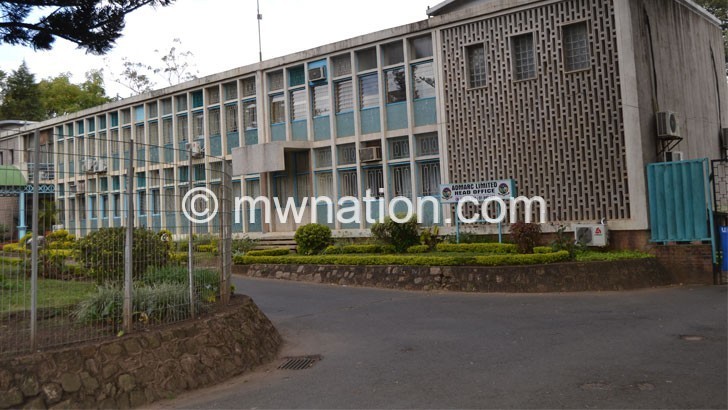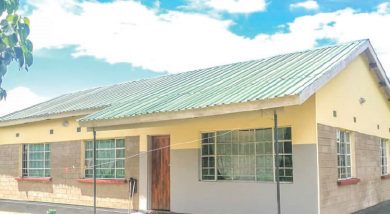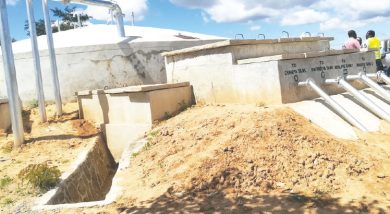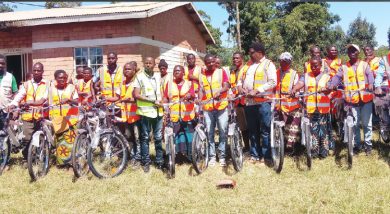Funding chokes Admarc commercialisation drive
Funding woes have stalled efforts to restructure Agricultural Development and Marketing Corporation (Admarc) into a commercially-oriented entity, the Ministry of Agriculture has conceded.
The development comes one year after the ministry shut down the State produce trader supposedly to pave the way for restructuring.

But in an interview yesterday, Ministry of Agriculture Principal Secretary Dickxie Kampani said Admarc does not have the resources to carry out its commercial functions.
He said it is imperative for Admarc to go commercial to sustain itself as government does not have the resources to keep financing Admarc.
Said Kampani: “It will take Treasury or bank loans to have Admarc go commercial. Admarc can get this money from anywhere, either from the bank or government.”
Ministry of Finance and Economic Affairs spokesperson Taurai Banda asked for more time to check how much Admarc had asked for to implement its business plan.
In September 2022, government suspended Admarc operations to pave the way for the restructuring process and in January this year authorities announced the termination of contracts of about 3 122 Admarc staff. The plan was to trim the workforce by half through fresh recruitment.
However, to date, only two new positions, chief executive officer and director of operations, have been filled.
O n w h e n t h e commercialisation plan will materialise, Admarc board chairperson Zachary Kasomokera said “it will take time” because turning around Admarc is not a small undertaking.
In an interview yesterday, he said commercialising Admarc would entail turning the produce trader into the main off-taker of agricultural produce in Malawi, of value addition and also making it a key player in establishing markets locally and internationally.
Said Kasomekera: “There is this mentality that you will just turn the key and Admarc becomes commercial. But we ought to be realistic. You cannot turn around a company in two or three months. Turning around a company like Admarc is not like turning around a shop.”
H e s a i d i n i t s commercialisation drive, Admarc is prioritising putting in place human resource. However, he could not say when the recruitment of staff will be finished.
Kasomekera added that there is also need for the senior management team to come up with a strategic plan to facilitate the commercialisation.
He asked the public to appreciate the social function that Admarc is playing now.
In a separate interview, Parliamentary Committee on Agriculture chairperson Sameer Suleman said there is no political will to restructure Admarc into a profit-making institution.
“Their words are not matching with action on the ground. Government is not serious about reopening Admarc but seems to be serious about shutting down Admarc. If you go to Admarc main depots, they are deserted,” he said.
Admarc had asked for K40 billion from government for recapitalisation to handle crop purchases, but government allocated K4 billion in the 2023/24 National Budget.
Government has since released K1.5 billion out of the K4 billion and instructed Admarc to use the money to pay salary arrears.
Admarc was created in 1971 as a statutory corporation mandated to, among others, market agricul tural produce and inputs, facilitate the development of the smallholder agricultural subsector and also attend to social obligations on behalf of government.
Until 1987, Admarc was the sole buyer of smallholder produce, but in 2004, it was incorporated as a limited liability company with government owning 99 percent of the shares.
A Poverty and Social Impact Analysis on Admarc conducted by former Secretary to the Treasury Milton Kutengule alongside Antonio Nucifora and Hassan Zaman indicated that the parastatal’s social functions ceased in early 2000s.






Malatya Karacalar Ticaret | Fatih KARACA Malatya Stihl Bayi, stihl malatya bayi, stihlmalatya,malatyastihl, stihl servisi, malatya stihl servis, malatya testere,malatyastihlbayi, stihl malatya, malatya stihl, stihl bayisi malatya, Hekimhan stihl bayi, malatya testere bayisi, malatya stihl servis, stihl malatya servis, Malatya’nın en köklü Stihl bayilerinden olan Fatih Karaca Ticaret mağazamız, hem stihl satışı hem de stihl servisliğini yapmaktadır.
Gurmezar ile Şimdi %100 Doğal Ürünler | %100 Organik adıyaman peyniri,fıstık ezmesi fiyat,çifte kavrulmuş tahin,fıstık ezmesi şekersiz,üzüm pekmezi fiyat,helva fiyatları,kars kasari,fiskobirlik fındık kreması,kars peynirleri,züber kakaolu fıstık ezmesi,yer fistigi ezmesi,kars kasar peyniri,uzum pekmez,bademezmesi,fındıkezmesi,yer fistik ezmesi,golden fıstık ezmesi,badem ezmeli,üzüm pekmezi fiyati,kars kasari fiyat,nutmaster fistik ezmesi,cevizli sucuk,şekerli leblebi,gün kurusu,orcik,kayısı kurusu,cevizli sucuk fiyat,gün kurusu kayısı fiyatı,gun kurusu,günkurusu